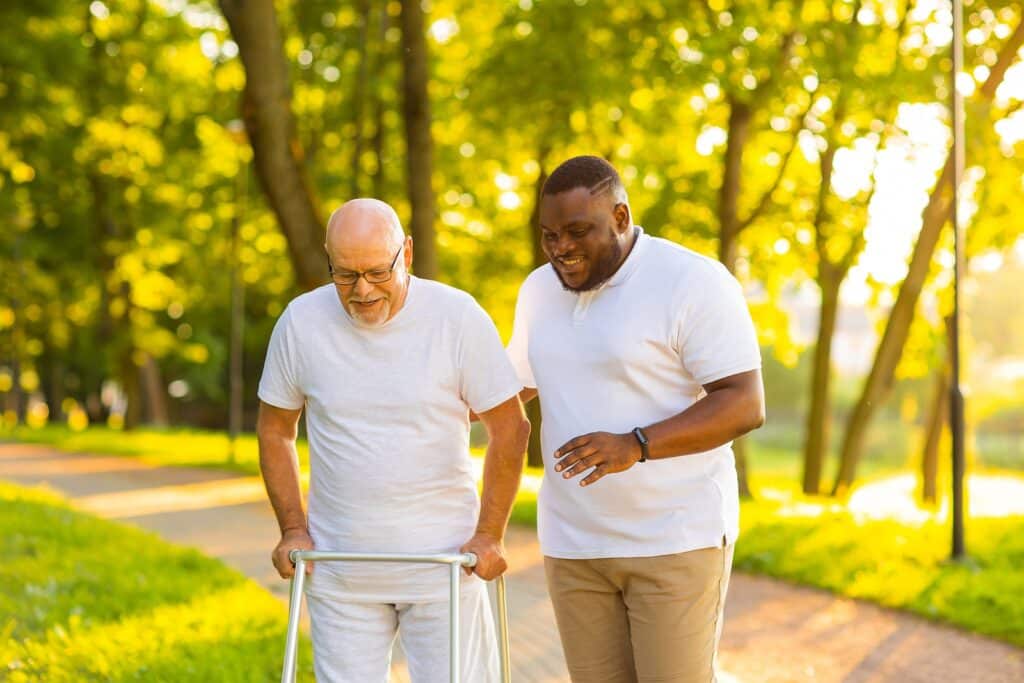It’s common knowledge that our bodies change dramatically as we get older. However, one component that may get overlooked is how age affects the quality of our veins. Vein diseases are becoming more common among the elderly, causing discomfort, pain, and, in some cases, major health complications if not treated. However, with correct awareness and home care interventions, seniors can effectively manage vein disorders, preserving their quality of life and mobility. In this blog, we will look at several common vein disorders in seniors and how having companion care at home can help.
Table of Contents
ToggleCommon Vein Disorders Seniors Face
While no situation is the same, there are some common vein disorders that could affect any senior, as seen below:
Varicose Veins: Varicose veins are big, bulging, and twisted veins that typically develop on the legs and feet. They can cause pain, irritation, itching, and potentially serious problems like ulcers and blood clots. Seniors are more prone to varicose veins due to weaker vein walls and valves, which restrict blood flow.
Deep Vein Thrombosis (DVT): DVT happens when a blood clot forms in a deep vein, typically in the legs. It can cause swelling, discomfort, and, in severe cases, pulmonary embolism if the clot dislodges and spreads to the lungs. Seniors, particularly those with restricted mobility or who spend extended hours sitting or lying down, are more likely to develop DVT.
Chronic Venous Insufficiency (CVI): CVI occurs when damaged venous valves prevent blood from returning to the heart, resulting in blood pooling in the lower limbs. Symptoms include leg swelling, discomfort, heaviness, and skin changes like discoloration and ulceration. Seniors with a history of venous problems or obesity are at a higher risk for CVI.
How Can Companion Care at Home Help?
With companion care at home by their side, seniors gain valuable tips that can help them manage vein disorders, such as using compression stockings or wraps. This is known as compression therapy, and it is thought to improve blood circulation, reduce swelling, and relieve the discomfort associated with varicose veins and CVI.
Companion care at home can also encourage seniors to engage in low-impact exercises like walking, swimming, or gentle leg stretches to improve blood flow and muscular strength. They might even help seniors create tailored workout regimens as well as participate in activities with them.
Beyond participating in physical activity with seniors, companion care at home can also provide valuable assistance with ensuring seniors focus on a healthy diet, stay hydrated, and avoid extended sitting or standing. These lifestyle changes can aid in the prevention or progression of vein problems.
Perhaps most importantly, companion care at home can help seniors find the information they need about various vein disorders as well as how to manage them best.
Vein disorders can have a substantial influence on the health and well-being of seniors, including mobility and quality of life. Seniors can effectively treat venous disorders and reduce the risk of complications by implementing proactive home care interventions that include compression therapy, exercise, healthy lifestyle promotion, medication management, and monitoring. Seniors who work closely with companion care at home and receive devoted help can maintain optimal vein health and continue to live an active and meaningful lifestyle as they age.
Sources: Source 1 | Source 2 | Source 3 | Source 4
Providing exceptional Companion Care at Home for seniors and families in the Northern Virginia area, including Arlington, Alexandria, McLean, Reston, Burke, Ashburn, Centreville, Springfield, Manassas, and Oakton. Call today to speak with our caring staff: (703) 272-8838.
- What Are Some Surprising Early Signs of Dementia? - May 22, 2025
- Training of the Month: Lymphedema - May 15, 2025
- Career and Opportunities Fair - May 15, 2025




